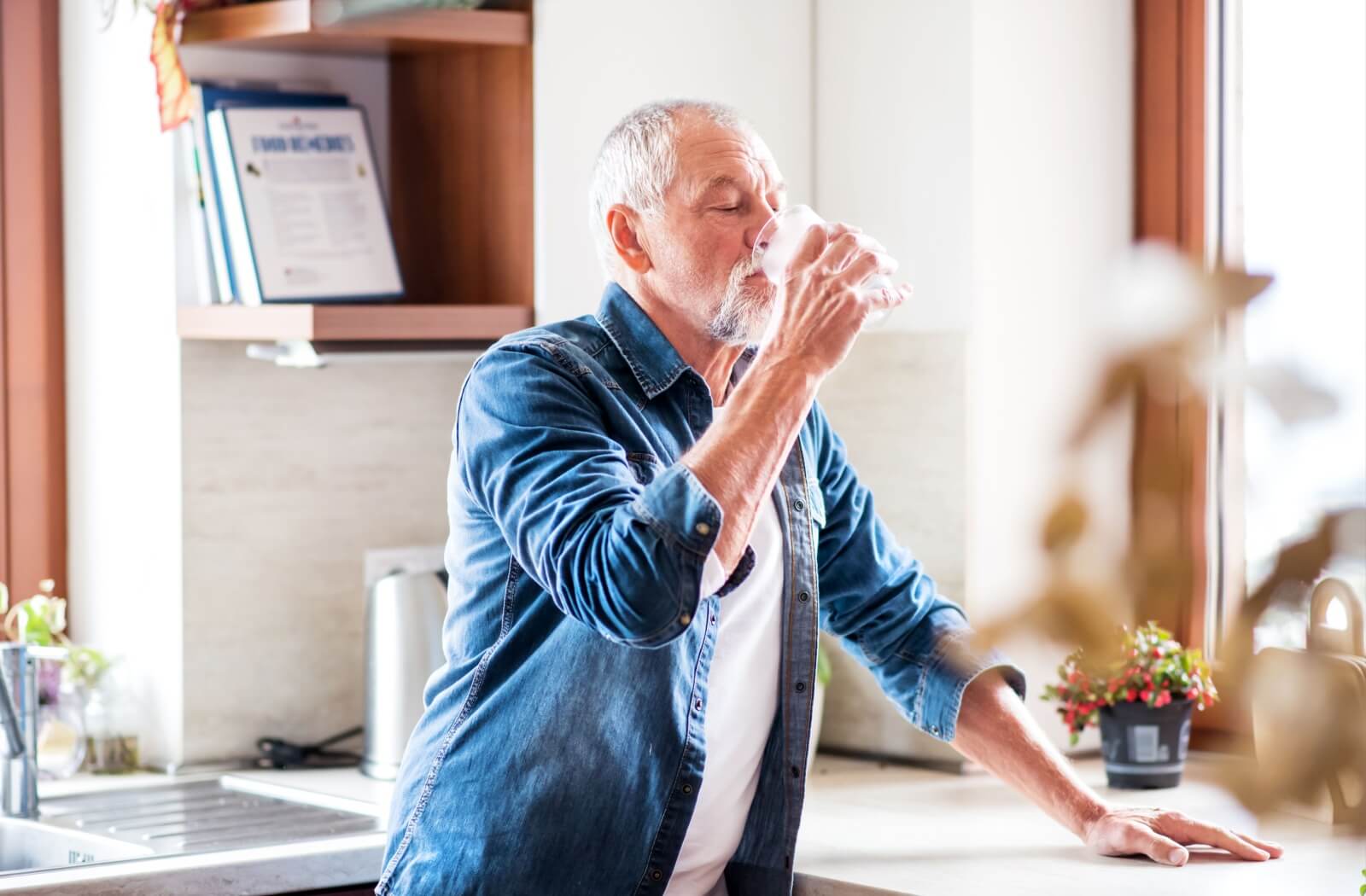A vital component of health, particularly for older adults, is proper hydration. As we get older, our bodies change, which makes it harder to stay hydrated. A number of factors increase the risk of dehydration in older adults, including decreased thirst feeling, medication that may cause dehydration, and physical impairments that may make it difficult to drink or access fluids.
Some people may not enjoy drinking plain water, and that’s okay! Along with water, fruit and vegetable juices, milk, coconut water, herbal teas, and infused waters can help boost hydration in older adults.
Why Is Hydration Important as We Age?
Due to the particular health issues and physiological changes that come with aging, seniors need to drink plenty of water.
Dehydration is a common consequence of growing older since our bodies’ capacity to hold water diminishes and our perception of thirst may lessen. This dehydration can worsen pre-existing medical diseases such as kidney dysfunction and urinary tract infections, as well as cause more serious problems including constipation, a higher risk of falls, and even cognitive decline.
Adequate hydration promotes improved physical and mental health by supporting vital body processes like digestion, circulation, and temperature regulation. As a result, sustaining a regular fluid intake is essential for avoiding dehydration and encouraging an improved standard of living as we age.
Signs of Dehydration
Older individuals may experience severe and rapid consequences from dehydration, so it’s critical to recognize the indicators of dehydration in them for their health and well-being. Seniors may not always exhibit obvious symptoms of dehydration, unlike younger people, therefore family members and caregivers must be cognizant.
Common symptoms of dehydration in seniors include:
- Dry mouth
- Lethargy
- Confusion or irritability, which can sometimes be mistakenly attributed to age-related conditions rather than dehydration
- Sunken eyes
- Dry or flushed skin
- Decreased urine output or dark-colored urine
Dehydrated seniors may also experience low blood pressure, fast heartbeat, or lightheadedness, particularly after standing up. These symptoms indicate the effects of dehydration on the cardiovascular system.
The first line of defense against the potentially dangerous health consequences that might result from dehydration is awareness of these symptoms, which emphasizes the significance of maintaining a regular fluid intake and the urgency of acting quickly when these symptoms are noticed.
Water: The Gold Standard
Without a doubt, the most recommended drink to stay hydrated is water. It’s the healthiest option because it contains no calories, sugar, or additives. Seniors should strive for 6–8 glasses each day, but specific health issues may affect this, so we encourage speaking with a healthcare professional for tailored guidance.
Coconut Water: Nature’s Sports Drink
For seniors, especially those who require a bit of additional hydration, coconut water is a great option. It is brimming with electrolytes, which help the body regulate its fluids. These include potassium, magnesium, and salt. It’s a healthy substitute for commercial sports drinks, which are sometimes loaded with artificial sweeteners and other additives.
Milk: More than Calcium
In addition to being a great supply of calcium, milk is a great source of hydration. Due to its combination of water, electrolytes, and protein, studies have indicated that milk can be a more effective hydrator than both water and sports drinks. Select skim or reduced-fat milk options to control your calorie intake.
Herbal Teas: Calming & Hydrating
Hot or cold, herbal teas are a great way to remain hydrated. In addition to offering a calming effect, alternatives like hibiscus, peppermint, or chamomile expand your options for hydration without caffeine, which can be dehydrating.
Fruit & Vegetable Juices: Liquid Nutrition
Juices provide vitamins and minerals in addition to water, making them a nourishing and hydrating choice. It’s crucial to select juices made entirely of fruits or vegetables and free of added sugars. Even better, adding fiber to smoothies made from blended fruits and vegetables makes them a more substantial and nourishing choice.
Infused Waters: A Fun Way to Hydrate
Infused fluids might be an attractive substitute for people who don’t like plain water. Fruit, vegetable, or herb slices can be added to water to organically improve its flavor. For a cool twist, try pairings like strawberry and basil, lemon and lime, or cucumber and mint.
Tips for Staying Hydrated
- Keep a water bottle accessible: Having water within reach encourages more frequent sips throughout the day.
- Set reminders: Use alarms or apps to remind you to drink water regularly.
- Monitor urine color: Light, pale yellow urine typically indicates good hydration, while darker urine suggests a need for more fluids.
- Eat water-rich foods: Incorporate fruits and vegetables with high water content, like watermelon, cucumbers, and oranges, into your diet.
Moving Forward
Maintaining hydration is essential for overall health and well-being, especially for older adults. Anyone can reap the benefits of optimal hydration and nutritional benefits from a range of hydrating drinks by including them in their daily routine.
Remember that every person has different needs, so it’s crucial to speak with a healthcare professional to figure out the ideal hydration plan for you or a loved one. These are just a few of the numerous things to think about when moving into senior living. Get in touch with The Enclave of East Louisville today to learn more about how your loved one can thrive in a senior living community.










